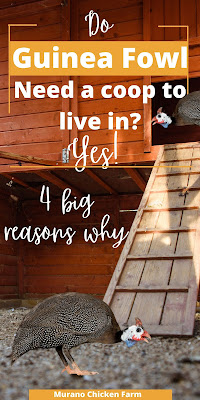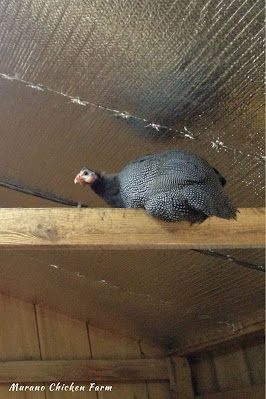I was recently chatting with some people about guinea fowl and one of them mentioned that she was thinking about getting guineas instead of chickens because they don't need a coop. This is the first I had ever heard of Guinea's not having a coop to live in.
Obviously we had a discussion about it and I pointed out that yes Guinea fowl actually do need a coop to live in. I started looking into it a little bit after that though and found out that there are a lot of people that believe that guineas do not need a chicken coop to live in. Guinea coop if you will. There are a lot of reasons why that's wrong and I'd like to talk about those today.
Why Guinea fowl need a coop
Here are my 4 reasons why you cannot keep guineas without a coop.
1) Keeps guineas safe from predators
Guinea fowl have all the same predators as chickens do. Raccoons, foxes, fishers, bears, bobcats and other wildcats, hawks and other birds of prey, snakes, coyotes, wolves and pretty much any meat eating wild animal that lives in your area.
Many of these predators hunt at night. Guinea fowl like to roost in the trees at night and raccoons are quite good at climbing trees! If a guinea is out in a tree all night long, they are very susceptible to predator attacks.
In the dozen or so years that I have raised guinea fowl almost every time one tried to sleep in the woods, it did not make it back in the morning.
2) Keeps guinea fowl out of bad weather
I talk about Guinea fowl and their cold tolerance in Are guinea fowl cold hardy?
The lead picture on that post is a few guinea fowl with snow and ice crusted feathers because they had decided to stay out one night when it rained (and got too far up in a tree for me to get them down) and the temperature turned freezing overnight. Their wet feathers froze.
Not only is this uncomfortable, but it could cause other problems. Exposure to moisture and cold in the winter can cause frostbite. I have had guinea fowl lose their toes from frostbite after standing in a puddle, while it was snowing. Imagine if they didn't have a dry coop to go back to at night... It could have been much worse.
Not to mention windstorms. If you live in an area that gets tornadoes or hurricanes you obviously absolutely need somewhere safe to lock them in when the weather gets bad. If you live in a hot climate, having somewhere they can go to get out of the sun can be very helpful.
3) A coop keeps guinea fowl at home
Guinea fowl have a tendency to get lost if they don't have a coop to come back to every night. Many people have a problem where they let their guineas outside and never see them again. Obviously this is a big problem, but Guinea fowl can easily be coop trained.
To coop train a guinea you keep it in the coop/run for a few weeks to help it understand that the coop is now its home. Once the guinea fowl are coop trained they can then be allowed outside to free range (which is where we want them to eat the ticks and other insects) and will come back to their coop each night.
Without a coop, Guinea fowl will roost in the trees but they have no reason to come back to your trees. They might decide they prefer the neighbors trees. So allowing guinea fowl to sleep in the trees every night is a sure way to start losing them.
4) A coop keeps scavengers away
You're going to need to feed your guinea fowl everyday. They do very good with foraging, but they still need feed. If you don't have a coop to put their food in where are you going to put their food?
If you just leave a feeder sitting outside then everything is going to be eating from it! Squirrels, mice, rats, chipmunks, opossums, bears, wild birds, raccoons and more will help themselves to your guinea's food. By being able to lock up the coop at night with the food inside this is no longer a problem.
You might be thinking that having a wild animal eat a little bit of feed is not a big deal. The problem is when they come along and they don't find any feed, but they realize the guinea fowl are there. Plus predators tend to hang out where prey does and rodents and other small critters are prey animals.
Also having wild birds eat from the same bowl as your guinea fowl could spread diseases, parasites and more to your guineas. Wild birds are the main reason Avian Influenza spread to backyard chickens last year!
Bonus reason: When your guinea fowl are sleeping in their coop at night, they are not choosing other, more damaging locations. Like in the trees above your car, or house, or on your porch railing. Remember that poultry poop in their sleep, so anything they sleep above has the potential to get covered in guinea droppings.
Giving them a coop keeps their nightly pile of droppings out of your way and in one place where it can easily be cleaned up!
So yes, while I'm sure you could have guinea fowl without a coop, they are safer and more comfortable with one!
Related reading: Of all the different poultry I have raised over the years, my favorites are guinea fowl, ducks and chickens! You can combine these flocks if needed and they all have the same basic needs where food and shelter are concerned.
~L
Want information on raising chickens sent right to your email weekly? Click right here to join my list and get new posts sent directly to you the day they're published ... plus, you'll also get the free download '25 Ways to save money raising chickens'.



I had guinea's once! They were young adults, not chicks, so we never 'bonded'. I rarely found their eggs and was leery of eating them when I did. .They didn't use the nests nor did they roost with the chickens. Truth be told, they flew over the chicken lot the first day and that's where they lived. Anywhere they wanted to. But they're the best 'alarms' I ever had. They knew specific cars and kept quiet. If an unknown vehicle came up my hill I knew quickly. If something crossed the yard in the middle of the night, I knew that, too. They chose to roost on my roof unless it was raining. Extremely strong shells, deep yellow yolks. They were truly delightful. Unpredictable and never 'tame' but fun.
ReplyDeleteGuineas like to hide their nests in brush or fallen trees. If you don't coop them up, you'll be doing a lot of egg hunting! lol They are amazing alarms! Sounds like you really enjoyed having them!
DeleteI also have 20 or so guineas for about 4 years now. They were kept in my grow out pen in the hen house/coop for 3-4 weeks before being let out to free range with the chickens. They slept in the hen house for a while but gradually more and more started roosting first on the top of the hen house then on a near by grape arbor and finally in various oak trees in the pasture and finally for the last months outside my bedroom so they serenade(usually quietly)all night long. I initially tried to catch them and return them to the hen house to roost but found out they are quicker, stronger and meaner than I am. I was reluctant to be to rough with them grabbing their legs, like I would a chicken, as I had read their legs are not strong and can break easily(not sure if that's true, as I usually ended up with scratches from those weak legs with very sharp talons ). They come to the hen house/run to be fed and investigate the inside daily but refuse to stay there at night.
ReplyDeleteThe thing with their legs is that if you grab just one, they will spin their entire body to try to get away and if your grip is too tight, it can injure their leg. If you grab both legs, they don't try this. They can definitely be tricky to catch!
Delete